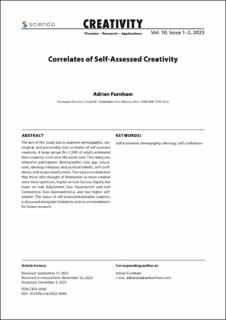Correlates of Self-Assessed Creativity
| dc.contributor.author | Furnham, Adrian | |
| dc.date.accessioned | 2024-02-07T17:09:13Z | |
| dc.date.available | 2024-02-07T17:09:13Z | |
| dc.date.created | 2024-01-18T14:57:01Z | |
| dc.date.issued | 2023 | |
| dc.identifier.citation | Creativity. Theories – Research - Applications. 2023, 10 (1-2), 110-118. | |
| dc.identifier.issn | 2354-0036 | |
| dc.identifier.uri | https://hdl.handle.net/11250/3116245 | |
| dc.description.abstract | The aim of this study was to examine demographic, ideological, and personality trait correlates of self-assessed creativity. A large group (N = 1,299) of adults estimated their creativity score on a 100-point scale. This rating was related to participants’ demographics (sex, age, education), ideology (religious and political beliefs), self-confidence, and six personality traits. The regression indicated that those who thought of themselves as more creative were more optimistic, higher on trait Curious (Open), but lower on trait Adjustment (low Neuroticism) and trait Competitive (low Agreeableness), and had higher self-esteem. The status of self-assessed/estimated creativity is discussed alongside limitations and recommendations for future research. | |
| dc.language.iso | eng | |
| dc.title | Correlates of Self-Assessed Creativity | |
| dc.title.alternative | Correlates of Self-Assessed Creativity | |
| dc.type | Peer reviewed | |
| dc.type | Journal article | |
| dc.description.version | publishedVersion | |
| dc.source.pagenumber | 110-118 | |
| dc.source.volume | 10 | |
| dc.source.journal | Creativity. Theories – Research - Applications | |
| dc.source.issue | 1-2 | |
| dc.identifier.doi | 10.2478/ctra-2023-0008 | |
| dc.identifier.cristin | 2229713 | |
| cristin.ispublished | true | |
| cristin.fulltext | original | |
| cristin.qualitycode | 1 |
